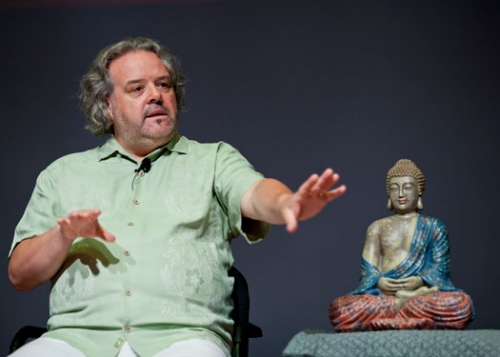
During the funeral for the 16th Karmapa, in Sikkim, India, Lama Tsony had a brief but significant encounter with Chögyam Trunga—a thunderbolt, as he describes it.
Bolstered by the fearlessness of compassionate wisdom, Chögyam Trungpa moved away from his background and culture and embraced life as it presented itself to him. He accepted reality as it was. By embracing the times he lived in, he turned the art of living into an enlightened master class on contemporary culture. Much to the shock, dismay and delight of others, he embodied a quality of fearlessness that was like licking honey off a razor blade.
Lama Tsony draws from the inspiration provided by this great teacher to talk about freedom; freedom from the system and freedom from traditions that may no longer serve our current conditions. Rather than revolution for the sake of revolution, Lama Tsony is teaching evolution for the sake of the world. Deconstruct, he says. Examine what’s there and see if it makes sense for you. Recognizing what is mistaken about our sense of identity is part of our evolution. As a sort of mantra, Tsony teaches to: reduce, re-use, recycle. Reduce your grasping, recycle the self into a wise and compassionate tool, and re-use your situations so they become wise and compassionate opportunities for evolution.
As Tsony puts it, when you’re riding the tsunami of life on the surfboard of buddhadharma, the obstacles become hesitation and spiritual materialism. These times are not for the faint of heart. To combat the hazards of this world, one needs compassion, attentiveness, and dedication. But what does one become dedicated to? How do you take your practice off the cushion and into this panic-stricken, consumerized world?
One thing is certain—of the 84,000 types of dharma the Buddha taught, one will come to the surface and that will be the right set of teachings that will serve us in these times. America’ s overall no bullshit approach, which Alexis de Tocqueville noted in his “Democracy in America,” is a saving quality for those practicing in the West and perhaps for the entire planet. By combining the critical observation of suffering and its cause with the softness of bodhisattva engagement, we may stand a chance to come away wiser and gentler from these challenging times.
Thank you for subscribing to Tricycle! As a nonprofit, we depend on readers like you to keep Buddhist teachings and practices widely available.